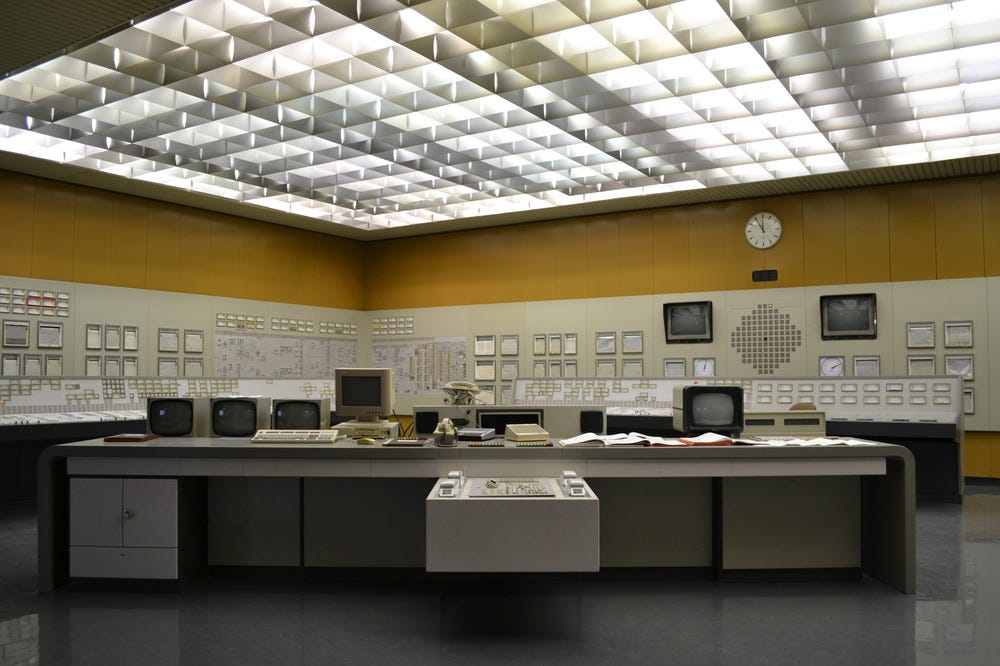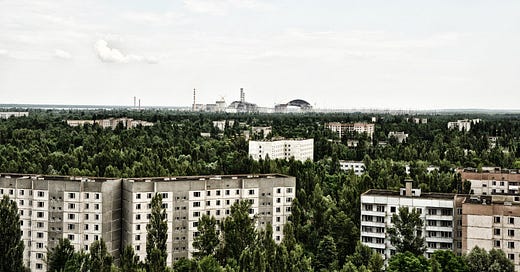Chernobyl
The April 1986 nuclear disaster at Chernobyl had long-lasting political and environmental consequences for Austria
Servus!
On April 28, 1986, Austria was consumed by domestic politics. The first round of that year’s presidential election was just days away, a contest that had garnered international attention and exposed People’s Party (ÖVP) candidate Kurt Waldheim’s Nazi past and connection to war crimes in Greece and Yugoslavia. The Freedom Party (FPÖ), then-junior partner to the Social Democrats (SPÖ) in coalition government, was, meanwhile, paralyzed by war between its liberal and nationalist wings, the latter headed up by the flamboyant populist Jörg Haider who would lead a successful Putsch that September.
That day, as campaigning in the presidential contest continued, dosimetrists working at the Forsmark Nuclear Power Plant near Uppsala, Sweden, were registering alarming levels of radiation, leading to the plant’s evacuation. By the afternoon, specialists at the Swedish Radiation Safety Authority were able to determine the radiation had nothing to do with Forsmark; rather, it was being carried over on the wind from the western Soviet Union. In the evening, Austrians tuning into the news heard their man in Moscow explain there had been an accident on April 26 at the Chernobyl Nuclear Power Plant, about 650 miles due east of Vienna. Only in the coming days would the full horror of the catastrophe become known.
Because of its geographical proximity, the Chernobyl disaster had immediate consequences for Austria in the form of radioactive fallout delivered by Europe’s shifting weather patterns. Children were kept from playing outside. The sale of certain vegetables—salad greens, spinach, cabbages, and so on—and products made from sheep and goat’s milk were banned; wild mushrooms were decreed off limits. Particularly affected were Austria’s Alpine highlands where rainfall dumped radioactivity upon the mountaintops, causing havoc for the region’s dairy farmers. With a half-life of 30 years, heightened levels of caesium-137 are still to be found in the mountainous areas of Salzburg, Styria, and Upper Austria.

The after-effects of Chernobyl were not only environmental but political. A 1978 referendum had killed off Austria’s only attempt to build a nuclear power plant at Zwentendorf an der Donau, 37 miles west of Vienna. Post-Chernobyl, opposition to nuclear power became official state policy—the subject of a 1999 constitutional law cementing a 1978 ban on nuclear energy in Austria—and a matter of national consensus. Born in the crucible of the Zwentendorf referendum, the disaster spurred the rise of the Green Party in Austria further. In 1986, its candidate, Freda Meissner-Blau, won 5.5 percent of the vote in May’s presidential election and the party entered parliament for the first time that October.


Chernobyl also made Austria acutely aware of its position as a landlocked country surrounded by nuclear reactors: Beznau, Gösgen, Leibstadt in Switzerland; Isar in Germany; Dukovany and Temelín in the Czech Republic; Bohunice and Mochovce in Slovakia; Paks in Hungary; and Krško in Slovenia. Opposition to nuclear power became part of Austria’s European policy, and in the early 1990s after the fall of communism, it tried to encourage via diplomatic and financial means the decommissioning of nuclear power plants in its immediate neighbourhood, albeit with limited success.

Austria is, as such, among the states deeply concerned about the Czech Republic’s most-expensive planned infrastructure project to date: a new €6 billion unit at the Dukovany plant where all four existing water-water energetic reactors are expected to be taken out of service in the 2030s. The opposition is not merely to the entrenchment of nuclear energy in the region. There is the fear that the plant could be compromised via Russian involvement and investment. Only last week did the Czech government exclude Rosatom from the tender process, though not before Miloš Zeman fired foreign minister Tomas Petricek who had come into conflict with the president over his Russophile views. In these arguments, we can hear not merely echoes of the Cold War but the Chernobyl disaster too.
Bis bald!
Thank you for subscribing to the Vienna Briefing. If you know someone who would be interested in receiving this newsletter, consider sharing it with them today.
The Big Bang
Indoor and outdoor dining at bars and restaurants will resume on May 19, chancellor Sebastian Kurz announced Friday. Cinemas, theatres, gyms, hotels, and other tourist attractions will also re-open, while indoor and outdoor events with limited crowds will be permitted. More than 2 million Austrians have now received their first dose of a coronavirus vaccine.
The Green Pass to Freedom
Austria is to introduce a ‘green pass’ system ahead of the EU’s own travel permit due in July. As of May 19, only those who have been vaccinated, have recovered from COVID-19, or can produce a negative test result will be permitted to visit bars, restaurants, gyms, and other cultural, tourist, and sporting venues. The green pass in the form of a QR code is expected to roll out in early June.
Doskozil Departs
Burgenland governor Hans-Peter Doskozil has resigned from the executive board of the federal Social Democratic Party (SPÖ). Doskozil criticized his party’s immigration policy and support for more restrictive measures designed to contain the spread of the coronavirus.




